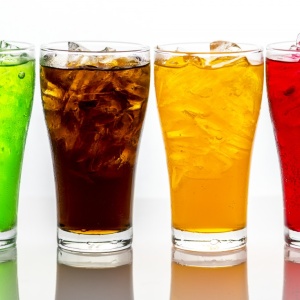
This systematic review of taxes on sugar-sweetened beverages (SSBs) finds that the taxes are associated with a decrease in the amount of sugar-sweetened beverages that are bought and consumed. A 10% tax lead to a 10% decrease in purchase and intake levels, on average, although there was considerable variation between results in different locations.
The paper reviews studies of SSB taxes where sales, purchase or consumption levels were compared either before and after the introduction of the tax in a single location, or where both taxed and untaxed locations were compared. Studies were not included in the analysis if they only considered a limited location such as a supermarket or a school, since these studies might not be generalisable to a wider geographical area. 15 studies met the criteria for inclusion in the review, including studies from several areas of the United States, Spain, Chile, France, Mexico, Finland and Hungary.
The figure below shows how SSB consumption rates vary according to the level of taxation.
 Image: Figure 4, Teng et al. Impact of sugar‐sweetened beverage taxes on consumption by the size of the tax in posttax compared with pretax period and/or taxed jurisdiction compared with a control jurisdiction. Note. Evaluations for the same tax were staggered to improve display of results. An alternative equation is presented in parentheses for a linear relationship (not displayed) that is allowed to vary from no effect when the tax is 0%.
Image: Figure 4, Teng et al. Impact of sugar‐sweetened beverage taxes on consumption by the size of the tax in posttax compared with pretax period and/or taxed jurisdiction compared with a control jurisdiction. Note. Evaluations for the same tax were staggered to improve display of results. An alternative equation is presented in parentheses for a linear relationship (not displayed) that is allowed to vary from no effect when the tax is 0%.
The authors note that further research is needed to determine the effect of SSB taxes on health outcomes such as oral health and overweight, as well as the possibility that SSB taxes lead to people replacing SSB consumption with other beverages (including alcohol) or foods.
Abstract
The aim was to conduct a systematic review of real‐world sugar‐sweetened beverage (SSB) tax evaluations and examine the overall impact on beverage purchases and dietary intake by meta‐analysis. Medline, EconLit, Google Scholar, and Scopus databases were searched up to June 2018. SSB tax evaluations from any formal jurisdiction from cities to national governments were eligible if there was a comparison between pre–post tax (n = 11) or taxed and untaxed jurisdiction(s) (n = 6). The consumption outcome comprised sales, purchasing, and intake (reported by volume, energy, or frequency). Taxed and untaxed beverage consumption outcomes were examined separately by meta‐analysis with adjustment for the size of each tax. The study was registered at PROSPERO (CRD42018100620). The equivalent of a 10% SSB tax was associated with an average decline in beverage purchases and dietary intake of 10.0% (95% CI: −5.0% to −14.7%, n = 17 studies, 6 jurisdictions) with considerable heterogeneity between results (I2 = 97%).The equivalent of a 10% SSB tax was also associated with a nonsignificant 1.9% increase in total untaxed beverage consumption (eg, water) (95% CI: −2.1% to 6.1%, n = 6 studies, 4 jurisdictions). Based on real‐world evaluations, SSB taxes introduced in jurisdictions around the world appear to have been effective in reducing SSB purchases and dietary intake.
Reference
Teng, A.M., Jones, A.C., Mizdrak, A., Signal, L., Genç, M. and Wilson, N., 2019. Impact of sugar‐sweetened beverage taxes on purchases and dietary intake: Systematic review and meta‐analysis. Obesity Reviews, Early View.
Read the full paper here. See also the Foodsource resource What can be done to shift eating patterns in healthier, more sustainable directions?







Post a new comment »